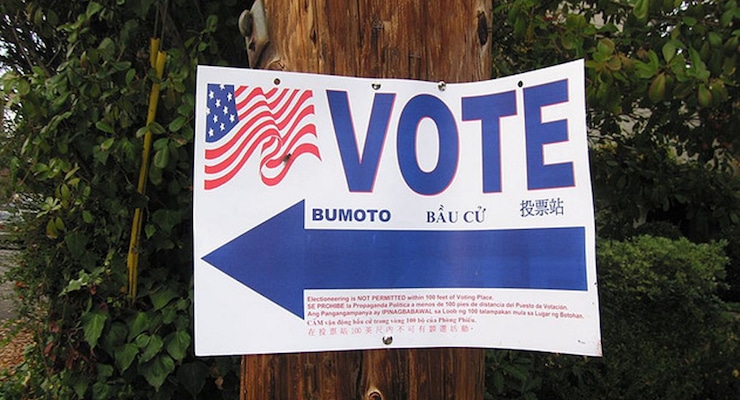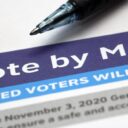

File photo of a California polling place sign. (Credit: Ho John Lee/flickr via Creative Commons)
Fox News host Bret Baier last Friday explained “On the Record” with Brit Hume how the networks’ decision desks call races for presidential candidates. What we heard out of Baier indicates that Big Media outlets have no intention of correcting the exit poll flaws that led them to cover past elections irresponsibly and make incorrect calls.
If you listen to the media, then you think the biggest exit poll blunder came in both the 2000 and 2004 presidential elections. But that’s only because their favored candidate lost. As far as the data go, the discrepancy has been far worse in other elections and they by far overestimate Democratic support and underestimate Republican support. This isn’t a new artifact or one U.S.-specific, either. Nigel Farage was getting ready to $H!t his pants the day voters decided Brexit.
But let’s talk about those previous elections first and others.
In 2000, the Voter News Service falsely led CNN, which was followed by the rest of the networks, to call the state of Florida first for Al Gore, then for George W. Bush. Eventually, they reported it was “too close to call.” On Election Day 2002, the Voter News Service completely fell apart, which led to the creation of the National Election Pool for 2004, consisting of major television networks and The Associated Press.
But the $10 million polling system also failed. The final wave of national survey data showed then-Sen. John Kerry with a statistically significant lead, or outside the margin of error. In fact, the final wave of national exit polls showed Mr. Kerry winning the popular vote by 51% to 48%, more than enough to carry the Electoral College.
He didn’t and news outlets were pissed. A report written by exit pollsters Joe Lenski and Warren Mitofsky basically told them to stop using exit polls to call elections.
“The exit poll is a blunt instrument,” Lenski told CNN during the review, adding “the polls are getting less accurate.”
Bill Wheatley, then the vice president at NBC News, which was a partner overseeing the new pool, suggested for future elections the survey data be reported later in the day. He was concerned about leaks for two reasons–influencing the vote and making the wrong calls.
“If it were not for leaks we would not have much of the problem forced on us by the leakees: the nonsubscribing media and the politicos,” the report said. “They don’t know how to evaluate what is being leaked, and then they demand that the leaked results be accurate in midday before it is vetted and before it is complete.”
“We made a mistake in not realizing the full impact of these leaked exit poll numbers on the political discourse of the day.”
Uh huh.
But what if you were trying to influence the election, as say, WikiLeaks clearly show the media have tried and continue to do today.
Well, you would continue to make the same mistakes, without telling viewers that they have been far worse than in 2000 and 2004. Further, you wouldn’t tell your viewers how lopsided the discrepancies have been.
In 1992, national exit polls overstated Bill Clinton’s support in the vote by 2.5%. While that’s roughly the same as Mr. Kerry in 2004, the election wasn’t close so nobody cared.
As Mark Blumenthal himself once wrote in his Mystery Pollster blog, Mr. Mitofsky, who ran the 2004 exit poll operation along with partner Mr. Lenski, wrote the following in the Spring 2003 issue of Public Opinion Quarterly (p. 51):
An inspection of within-precinct error in the exit poll for senate and governor races in 1990, 1994 and 1998 shows an understatement of the Democratic candidate for 20 percent of the 180 polls in that time period and an overstatement 38 percent of the time…the most likely source of this error is differential non-response rates for Democrats and Republicans:
From the internal CNN report on the network’s performance on Election Night 2000 (p. 48 of pdf):
Warren Mitofsky and Joe Lenski, heads of the CNN/CBS Decision Team, told us in our January 26 interview with them that in VNS’s use of exit polls on Election Day 2000, the exit polls overstated the Gore vote in 22 states and overstated the Bush vote in 9 states. In the other 19 states, the polls matched actual results. There was a similar Democratic candidate overstatement in 1996 and a larger one in 1992.
In fact, as Blumental points out, Mitofsky and Lenski said exit polls have overstated Democratic support in every election since 1990 (and badly in 1980). In 2000, some of the biggest doozies, including a few battleground states, which Colorado really wasn’t back then, are below and have been taken directly from the internal report:
- Alabama: Exit Poll Gore + 1.2; Result: Bush + 14.9
- Arizona: Gore + 3.6; Result: Bush + 6.3
- Colorado: Gore + 3.1; Result: Bush + 8.4
- Georgia: Bush + 4.7; Bush + 11.7
- North Carolina: Gore +3.0; Result: Bush+12.8
In an internal report from CNN, Joan Konner, James Risser, and Ben Wattenberg said in conclusion:
Exit polling is extremely valuable as a source of post-election information about the electorate. But it has lost much of the value it had for projecting election results in close elections…[Their recommendation to CNN:] Cease the use of exit polling to project or call winners of states. The 2000 election demonstrates the faults and dangers in exit polling. Even if exit polling is made more accurate, it will never be as accurate as a properly conducted actual vote count.
Then why not shut the hell up until raw vote totals confirm the exit polls?







Nicnamered / November 9, 2016
@PPDNews Let me guess, because it divides us? I hate EV, polling, and anything that causes Americans to hate 1 another.
/
Brent Skilton / November 9, 2016
@PPDNews With exits now proven so inaccurate, and states so fast at getting totals, is there any need for exits any more?
/
TRUMPED! / November 10, 2016
You can’t use ETHICAL and NEWS OUTLETS in same sentence.
/